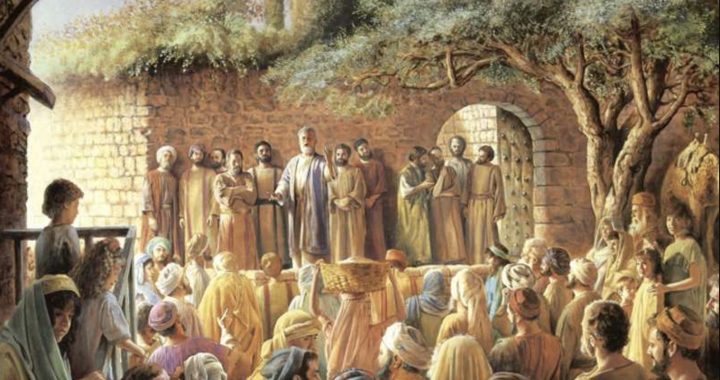Christ commissions the baptised as His disciples to evangelise but not all obey Him
Christ calls every Catholic in each age and generation to spread the good news about Him. This command to evangelise to all nations comes after His resurrection and before His ascension into Heaven, when Jesus appeared before His disciples.
All three Synoptic Gospels record the Saviour of the World commissioning us, His disciples. In Matthew 28, Christ says, “All authority in heaven and on earth has been given to me. Go therefore and make disciples of all nations, baptising them in the name of the Father and of the Son and of the Holy Spirit, teaching them to observe all that I have commanded you; and lo, I am with you always, to the close of the age.”
This Great Commission did not end with the death of the last Apostle, but is given to every baptised Catholic until the “close of age” or until He returns (Luke Lk 17:24, 2 Peter 3:10).
So, knowing what Christ and the Church teach us about evangelism, why do we see many neglecting the Commission He has given to all of us? What are some of the common excuses for not evangelising to those who have not heard or properly understood the Good News about Jesus Christ?
I’ve heard many, but these are the common Top Ten and my response to each one:
1. Everyone already knows about Christianity, they can google search the Internet if they don’t
Today’s generation suffers from information overload. With so many voices on the Internet competing for our attention, it makes a lot of difference when someone accompanies us in our spiritual quest.
2. I’m not the kind to talk about my faith, I evangelise by my actions
It is true that evangelisation is both by deeds and words. Strictly speaking, evangelisation by words is called “proclamation” or “evangelism” and it is equally important as our lifestyle witness. Pope St Paul VI in Evangelii Nuntiandi (Nos 22) asserts that witness by actions “always remains insufficient, because even the finest witness will prove ineffective in the long run if it is not explained, justified – what Peter called always having ‘your answer ready for people who ask you the reason for the hope that you all have’ – and made explicit by a clear and unequivocal proclamation of the Lord Jesus. The Good News proclaimed by the witness of life sooner or later has to be proclaimed by the word of life. There is no true evangelisation if the name, the teaching, the life, the promises, the kingdom and the mystery of Jesus of Nazareth, the Son of God are not proclaimed.”

3. I’m not a holy Catholic
Neither was the Samaritan Woman in John 4. And yet, she quickly spread the message about the Messiah, by simply giving her witness to what Jesus had done for her (John 4:29). If we are trying to win people to ourselves, perhaps our personal sanctification may be the most important thing. But actually, who we are winning people to, is the Lord. It will be a big relief to you to know that the Gospel is not about you; it’s about Jesus and the question they have to grapple with is, “Who is this Jesus?”
Having said that, evangelising will give us a boost to be more conscientious about our personal behaviour and life witness. So, evangelising will help you achieve your goal to be holy!
4. Non-Christians are going to ask me about the sex scandal. Why would we want to invite them to join our Church with all its problems?
Humbly acknowledge that the Catholic Church has messed up big-time. And Jesus made it clear what he thought about hypocrites. While it will be important to eventually talk about the Church, at this point we just want to focus on Jesus.
5. I don’t know enough about my faith and they will ask me something which I don’t know how to answer
If your non-Christian friend asks you a question that you don’t know, be humble to admit your ignorance and offer to get back to him with the answer. It’s a chance for you to grow in the knowledge of the faith as well. But this question may be a diversion and you can invite him to return to your testimony or presentation of the Gospel. The Samaritan woman also tried to catch Jesus with such a question. He responded briefly and went to the heart of the matter (John 4: 19-26).
6. They already have their own religion and they are even better than us Catholics
Pope St John Paul II explained that respect for other religions “does not eliminate the need for the explicit proclamation of the Gospel in its fullness. Especially in the context of the rich array of cultures and religions in Asia it must be pointed out that ‘neither respect and esteem for these religions nor the complexity of the questions raised are an invitation to the Church to withhold from these non-Christians the proclamation of Jesus Christ’” (Ecclesia in Asia, Nos 20). We are called not to judge, and this includes deciding whether a person needs Jesus or not. Nicodemus was a teacher of the law and yet Jesus told him he had to be born again (John 3). We are called to respect each individual and their rights to know Jesus Christ.
7. I don’t want to come across as a pushy religious fanatic. If my friends want to know about Christianity, they can ask me
If you had the cure for cancer, would it be pushy to share it with others who are dying from the disease? We often see Jesus and the disciples take the initiative to enter into towns and preach the Gospel (John 4-5, Acts 8:26-40). There is a difference between disagreeing and being disagreeable. And if they do not want to accept the message of reconciliation, Jesus asks us to “shake the dust off your feet” and leave the situation to God (Matt 10:14).
8. Honestly, I’m scared they will reject me
The fear that some people would react negatively is not groundless. Jesus did not promise his disciples popularity but persecution (Matt 5:11). Christ Himself was rejected and explains, “whoever rejects you rejects me; but whoever rejects me rejects Him who sent me” (Luke 10:16). So don’t take this personally. But this is exactly when we will know if we have true faith when we desire to obey and please God rather than to fear man. American evangelist Bill Bright said it well, “success in witnessing is simply sharing Christ in the power of the Holy Spirit and leaving the results to God.”
9. I don’t have the time to evangelise
We always find time for what is important. Even if you are not able to invest time to be discipled in evangelism, you can just share naturally with the people around you how God has made that change in your life.
10. I don’t know how to evangelise
Read my next article, Catholic 10-point guide to ‘How to Evangelise’




